
Marcello Vincenzo Domenico Mastroianni was an Italian film actor, regarded as one of his country's most iconic male performers of the 20th century. He played leading roles for many of Italy's top directors in a career spanning 147 films between 1939 and 1997, and garnered many international honours including 2 BAFTA Awards, 2 Best Actor awards at the Venice and Cannes film festivals, 2 Golden Globes, and 3 Academy Award nominations.

Angelo Peruzzi is an Italian football coach and former goalkeeper, and a three-time winner of the Serie A Goalkeeper of the Year award.

Giuseppe "Pino" Donaggio is an Italian musician, singer, and composer of film and television scores. A classically-trained violinist, Donaggio is known for his collaborations with director Brian De Palma, and for his work in both European and American genre cinema. He has won two Italian Golden Globe Awards, and has been nominated for two David di Donatello, four Golden Ciak, two Nastro d'Argento, and a Saturn Award.
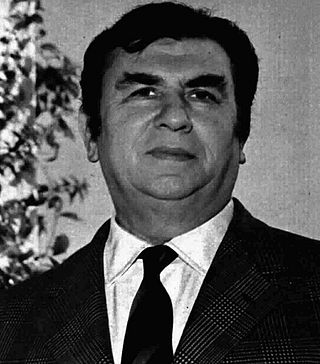
Luigi Cervi, better known as Gino Cervi, was an Italian actor. He was best known for portraying Peppone in a series of comedies based on the character Don Camillo (1952–1965), and police detective Jules Maigret on the television series Le inchieste del commissario Maigret (1964–1972).

Armando Trovajoli was an Italian film composer and pianist with over 300 credits as composer and/or conductor, many of them jazz scores for exploitation films of the Commedia all'italiana genre. He collaborated with Vittorio De Sica on a number of projects, including one segment of Boccaccio '70. Trovajoli was also the author of several Italian musicals: among them, Rugantino and Aggiungi un posto a tavola.
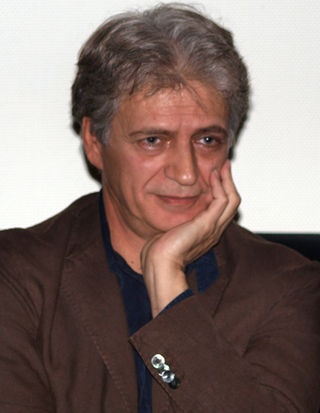
Fabrizio Bentivoglio is an Italian cinema and theatre actor and screenwriter.
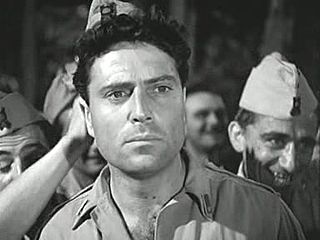
Raffaele Vallone was an Italian actor and footballer. One of the top male Italian stars of the 1950s and '60s, he first became known for his association with the neorealist movement, and found success in several international productions. On stage, he was closely associated with the works of Arthur Miller. He played the role of Eddie Carbone in A View from the Bridge several times, notably in Sidney Lumet's 1962 film adaptation, for which he won the David di Donatello for Best Actor.

Massimo Girotti was an Italian film actor whose career spanned seven decades.

Anna Karenina is a 1997 American period drama film written and directed by Bernard Rose and starring Sophie Marceau, Sean Bean, Alfred Molina, Mia Kirshner and James Fox. Based on the 1878 novel of the same name by Leo Tolstoy, the film is about a young and beautiful married woman who meets a handsome count, with whom she falls in love. Eventually, the conflict between her passionate desires and painful social realities leads to depression and despair.

Claudio Gora, Emilio Giordana was an Italian actor and film director.

Caterina Davinio is an Italian poet, novelist and new media artist. She is the author of works of digital art, net.art, video art and was the creator of Italian Net-poetry in 1998.
Net-poetry is a development of net.art, involving poetry. This kind of experimental art was born in several different cities and countries around 1995.
Tirelli Costumi Roma is a Rome-based costume house, which makes and supplies period costumes to motion picture productions. It has been sited, along with Costumi d'Arte and Peruzzi, as one of the best resources for 18th-century costumes.
Pompei 2000, often known as Ditta Pompei simply as Pompei, is an Italian manufacturer of shoes for film and stage productions. Founded in 1932 by cousins Ernesto and Luigi Pompei, it has primarily served Cinecittà film productions. In the 1960s, it manufactured classical foot gear for the numerous sword and sandal epics being made at Cinecittà. Since the 1970s when the company was passed down to Ernesto's son, Carlo Pompei. Their stock consists of approximately 800,000 thousand shoes.
Antonio Bueno was an Italian painter of Spanish origin, who acquired Italian citizenship in 1970. He was born in Berlin while his journalist father was posted there by the newspaper ABC of Madrid.

Enrico Coleman was an Italian painter of British nationality. He was the son of the English painter Charles Coleman and brother of the less well-known Italian painter Francesco Coleman. He painted, in oils and in watercolours, the landscapes of the Campagna Romana and the Agro Pontino; he was a collector, grower and painter of orchids. Because of his supposedly Oriental air, he was known to his friends as "Il Birmano", the Burmese.
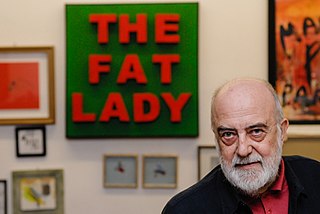
Ugo Carrega was an Italian artist and poet. Carrega was one of the main exponents of visual poetry, although he preferred the term "New Writing", an experimental form of writing that combines signs of different extraction. Carrega was active mainly in Milan, where he founded the cultural centers Centro Suolo (1969), Centro Tool (1971), Mercato del Sale (1974) and Euforia Costante (1993). He also founded and directed the art magazines Tool (1965), Bollettino Tool (1968), aaa (1969) and Bollettino da dentro (1972).
Keizo Morishita was a Japanese painter who lived most of his life in Italy.
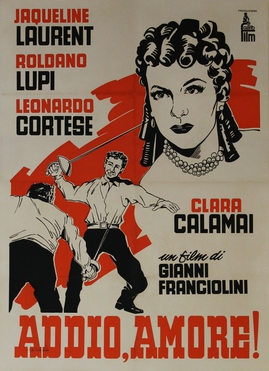
Farewell Love! is a 1943 Italian historical drama film directed by Gianni Franciolini and starring Jacqueline Laurent, Clara Calamai and Roldano Lupi. It is based on the 1890 novel of the same title by Matilde Serao.












